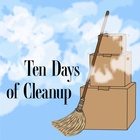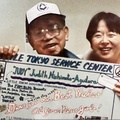I couldn’t believe it, but we could now see the back of the storage unit. Well, at least one corner. We had only five days to go before I had to completely empty it out.
Next was a black box. My daughter Sycamore and I had come prepared with a box cutter and I carefully guided the blade along the center seam. We flipped open the flaps. Bubble wrap. A lot of it. Whatever was inside must be fragile.
Sycamore dipped her head in and came up with her hands full. “Look at these mini-records.”
“Those are 45s.” I knew the American term for seven-inch vinyl records from my ex and Sycamore’s dad, Stewart, who was a huge music fan. When we split up, we had no arguments about who would get the record collection. I only had two albums, Stevie Wonder’s Songs in the Key of Life and Kyu Sakamoto’s Sukiyaki. Sukiyaki had been an early gift from Stewart, a kind of joke because I didn’t care for Japanese music. Since I wasn’t planning to get a turntable, I easily relinquished those two.
Sycamore read the writing on each of the 45s, which were in paper sleeves. “Suzee Ikeda,” she read the name of the recording artist.
“I’ve never heard of her.” Must be a Sansei woman, judging from the era of 45s and her name.
She glanced at the label. “What’s MoWest?”
“Not sure.” Must be related to Motown, I thought. My friend from Japan and I were die-hard Stevie Wonder and Marvin Gaye fans. In fact, if Sycamore was a boy, I had mentioned to Stewart that I wanted to name our newborn Marvin.
All this nostalgia wanted me to call Stewart, but I stopped myself. He and his wife were dealing with a small baby of their own. I picked up Sycamore’s iPad to search for “MoWest.” Sure enough, it was the Los Angeles branch of the Motown label. It was very short lived, lasting only two years from 1971–1973. Motown moved from Detroit to Los Angeles in the middle of those years. No need for MoWest anymore. “Look, we can just listen to her music on YouTube.”
“No, Mom. We need to listen to the records.” Sometimes Sycamore could be very bossy.
We brought the records into the car along with twelve tambourines that also were in the box. I had a feeling that it wouldn’t be difficult to unload the records—but the tambourines?
Once we returned home, I knew who to approach about a turntable. Ken, our hakujin neighbor from across the courtyard. He played guitar in a band but had carpal tunnel surgery right before the pandemic hit. When the bandages were finally off, he was stuck at home instead of playing his music on the road. It seemed like he was drowning his sorrows by playing records at super high volumes. The neighbors in the next cottage, an older Black couple named Chris and Stacy, didn’t seem too happy about it. Chris was on disability and rarely left his easy chair. I knew about his easy chair because he positioned it in front of their door, which he usually kept open.
Stacy worked nights at Target. I knew that she did without really talking to her because I often saw her leaving for her car around five o’clock in the trademark Target red vest or shirt with khaki pants.
Wearing my mask, I made sure to stand a distance from Ken’s door after knocking. “Ah, hi. I’m Hiroko from across the way.”
“Sure. How are you and your daughter doing?” Ken spoke through his screen door.
“Okay. Baking a lot of bread. Finally made a good one yesterday.” I didn’t know why I had to share that information. “Well, I know that you have a stereo system. We don’t have one. And we have a few of these 45s. I wonder if you could play them for us. There are only like about five of them.” I left the 45s on his steps and backed off as he opened his screen door to retrieve them.
“Motown, huh?” he said, glancing at the labels. “Suzee Ikeda. Never heard of her. Japanese name, right?”
I nodded. He went back inside with the 45s. We were going to be treated to a mini-concert.
Sycamore had already set up two lawn chairs on the dead grass in the middle of the courtyard. I sat in one of them and surveyed the cottages and two-story unit around the courtyard.
I never paid much attention to my neighbors but during the pandemic, I was becoming more aware of their regular routines. The single Armenian woman in the front cottage walked her chihuahua two times a day, once before breakfast and then after dinner. The Colombian graduate student across from her subscribed to multiple print newspapers that were left on his walkway until about noon. The young couple next to me seemed to be having some domestic problems during the pandemic as I was sometimes awakened by yelling in the middle of the night. Thankfully, Sycamore was a deep sleeper and never stirred. The couple across from them were expecting a baby. I could keep track of the passage of time by watching her baby bump grow.
The main two-story building in the middle of our U housed a number of college students who could have attended Art Center, USC, Caltech, Pasadena City College, or Fuller Seminary. Our area was close to multiple colleges and a fresh crop of residents seemed to replace the ones who left every few months or so. In spite of the California rules about not gathering, the college students often had parties, which drove Chris crazy. He dispatched Stacy to shut it down. If that didn’t work, the police were called.
Strumming of a guitar, a blast of orchestral music, and the beat of congos reverberated from Ken’s cottage. And then a delicate voice reminding me a little of an adolescent Michael Jackson.
“Can’t give back the love that I feel for you,” Suzee Ikeda moaned plaintively, echoed by female back-up singers.
Stacy ran out of her and Chris’s cottage onto the dirt. Oh, oh. It looked like our concert was going to come to an end. Chris teetered out with a cane. This was serious. He frowned at Ken’s cottage and then glared at us. We were all masked like a scene in a western.
“That’s not Diana.”
“Huh?” Both Sycamore and I were confused.
“Diana Ross. That’s her song.”
“This is Suzee Ikeda,” Sycamore explained.
Ken then emerged from his unit. “Just Googled her. She was the first Asian American to record with Motown.”
“Motown!” Chris didn’t seem amused. But with each single, his shoulders began to loosen. Was he tapping the end of his cane on the walkway?
The horns on “I Can’t Erase the Way I Feel” heralded the frustration of a woman trying to forget an unfaithful ex-lover. The songs of Suzee Ikeda seemed to have a consistent theme.
Ken, masked with a bandana, walked over to me. “This music is great.”
“Yes, it’s not bad,” I said. “Would you like to keep all the 45s? But you’ll have to take twelve tambourines, too.”
“You’re kidding me?”
I shook my head.
“I don’t know what I’ll do with the tambourines though. Maybe the college students will want them.”
I shrugged and then winced. I’m sure Chris will kill me if the students supplemented their partying with tambourine shaking.
Ken returned to his cottage and turned the volume up on his speakers, which he moved to the front of the door. Sycamore was out of the lawn chair and jumping up and down to the music.
“Dance, Mom, dance!”
“No, Japanese people don’t dance,” I said.
“Mom!” Even Sycamore knew how ridiculous my statement was.
Meanwhile, a dance party had broken out on the dead grass. Chris was out with his cane, obviously not swinging his hips, but stepping back and forth with Stacy. The woman from the front unit was clutching her chihuahua and swaying to and fro. The pregnant woman, who looked like she would be ready to go into labor at any point, rubbed her swollen belly. Even the couple that regularly fought slow danced together. A couple of the college students came out, jerking their bodies like they were having convulsions.
“Come on, Mom!”
The shaking of a tambourine and then sounds like the buzzing of a bee echoed from speakers. Soon Suzee and her backup singers were belting out, “Zip a dee doo dah, what a wonderful day.”
I walked onto the dirt and closed my eyes for a moment, allowing the voice of Suzee Ikeda enter my body.
*To listen to Suzee Ikeda’s music:
- “Can’t Give Back the Love that I Feel for You”
- “Zip A Dee Doo Dah”
- “Tell Me How I’m Gonna Make It”
- “I Can’t Erase the Way I Feel”
- “Time for Me to Go”
© 2021 Naomi Hirahara





